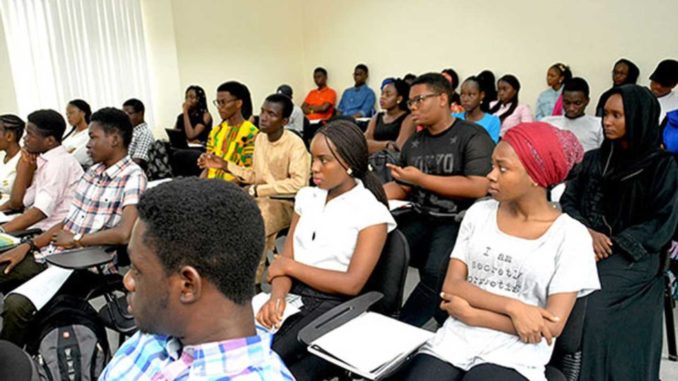
President Muhammadu Buhari the other day underlined the importance of education to national development and cited its quality as the best means of lifting people out of poverty. The president made the point at the commissioning of the Postgraduate Centre of Excellence at the Ahmadu Bello University, Zaria, in Kaduna State. According to the president, his “administration places much premium on education at all levels, as it is the bedrock of society’s progress and the way to overcome poverty.”
The president further expressed his concern over the state of facilities in Nigerian universities due to the perennial funding problem. While noting that his administration had spent about N1.3 trillion on the development of the education sector in the past four years, excluding funds spent on overhead and personnel costs, he promised that his administration would continue to give education a pride of place in his policy enunciations.
There is no denial of the importance of education to the development of modern societies. Knowledge, as the saying goes, is power. Its application to material production unleashes development in its entire ramification. Serious governments make it the pillar of their development strategies. At the beginning of the prevailing century both President Clinton and Prime Minister Tony Blair made it a priority programme while in office in their respective countries. More important is the fact that education underpins the famous “Asian miracle.”
The Nigerian leader should note that the interesting thing about these countries was that they went above rhetoric to concrete exertions with the effect that everyone could see the ramifying impact on the spiritual and material wellbeing of their people. Eight countries in East Asia, namely, Japan, South Korea, Taiwan, Hong Kong, Singapore, Thailand, Malaysia and Indonesia were at the core of the “East Asian miracle” because of the thespian growth of their economies. Between 1965 and 1990, while the miracle was unfolding, their gross domestic product (GDP) doubled and there was a corresponding momentous reduction in poverty and income disparity.
Today, the result is that people in East Asia live longer with life expectancy put at about 75 years. They are more literate as most go to school for longer periods and their standard of living is remarkable. Many have adduced various reasons for this miracle such as business model and authoritarian approaches, but the real kernel lies in the quality of education. Indeed, human resource development accounted for what is known as education miracle at the back of the economic miracle.
Without equivocation, the Academic Staff Union of Universities (ASUU) has been at the vanguard of organisations clamouring for improvement in the educational sector, especially at the tertiary level. It has pointed out the lack of interest of minders of state policies to prioritise education and has incessantly proffered solutions to resolve the contradictions in the sector. Often, it has met with a listless Federal Government. Little wonder that the president’s statement could elicit a response from the body. In its response to the president statement, through one of its branch chairmen, Prof. Deji Omole, ASUU advised the President to go beyond rhetoric to action. Omole noted that “Nigeria can only be developed by Nigerians themselves and they can only develop if they have quality education to grow the economy. So, it is not enough to make a political statement, you must follow it with action.”
Truly, education has lifted people out of poverty where it has been prioritised. Our country today earned the unenviable position of the seat of global poverty with over half of its population living in extreme poverty. The mass deprivation that Nigerians face is not as a result of some celestial curse but the choice we have made. Access to some basic necessities for growing the mind and body is certainly at the roots and education is one of them. As the late Claude Ake noted of African leaders including Nigeria, development has never been on the agenda and for them politics is warfare. Where there is no development agenda, education is inherently discounted. The current administration is intolerant of conversation within the polity and is not enamoured of education with its consequent liberalism.
Besides, budgetary statistics speak to the reality of funding of education in Nigeria and put a lie to claims of adequate funding by the president. Between 2015 and now, allocation to education has never exceeded the seven per cent threshold reached under the previous administration. Serious countries try to stay or nudge above the UNESCO 26 per cent threshold. Nigeria is far from the double-digit zone. Governments act and not just talk when they are committed to policies and programmes. Doubtless, government has not demonstrated enough commitment to education.
Even while scarcity of resources may be pleaded for their lack-luster focus on education, government can do well by reprioritising things. One indicator of a serious government on the question of education is the level of investment in the sector and secondly by mindful insertion of round pegs in round holes, that is putting a professional in charge of education with the concurrence of major stakeholders in that sector. On the whole, as we have always noted, leaders at all levels in Nigeria should always bear in mind that there is a link between the quality of education and development in any country. And so Nigeria cannot lead Africa if its commitment to funding education is not robust.
END

Be the first to comment